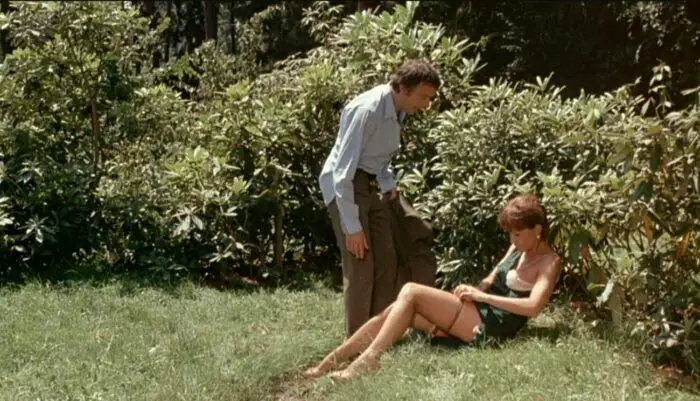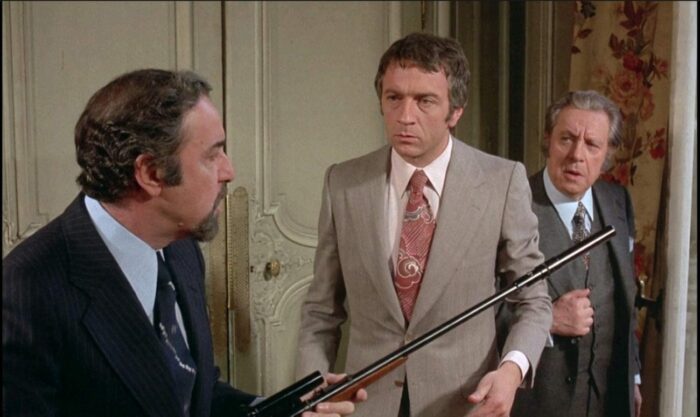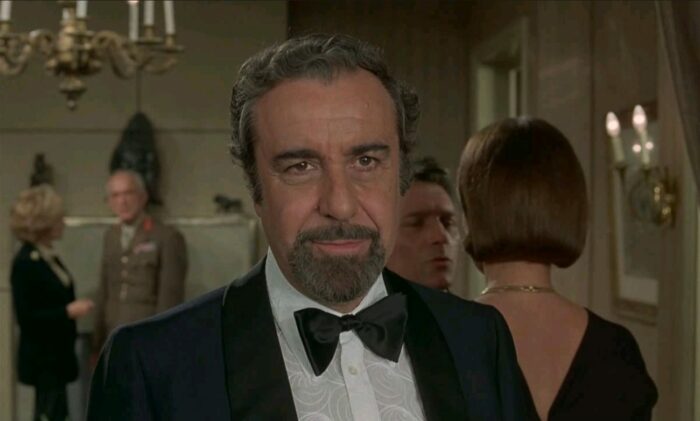The act of eating and drinking is a baseline necessity for survival across all economic and social backgrounds. However, for the upper echelons of society, the simple act of dining can often be used as a badge of achievement and privilege that was used to exclude poorer individuals deemed unrefined in their diet or manners of consumption. In Luis Buñuel‘s comedic and semi-surrealist film The Discreet Charm of the Bourgeoise (1972), the act of dining is repeated, failed, and occasionally abandoned as Buñuel highlights the tenacity of affluent individuals to repeatedly seek out failed events of leisure that most poor people cannot afford to waste resources on.
The absurdity begins at the very start of the film, when all the main characters become upset when their host Alice (Stéphane Audran) has the dinner planned a day ahead of schedule, causing an impromptu drive to a local inn to have dinner before they realize the owner of the inn has died. Director Luis Buñuel effectively highlights the contradictory nature of the main characters as they bring Alice along to the inn in her nightwear and comment on the lack of guests or a lively atmosphere, despite one of their group members not being dressed suitably for a public dining environment. Their annoyance at a ruined dinner is juxtaposed with the greater dilemma of the inn staff grieving the death of their boss while they await the undertaker to retrieve the body, exposing the trivialness of the wealthy characters’ dinner plans compared to the current situation their servers are in.
Another instance of an absurd situation during a meal plan is when Alice and her husband Henri (Jean-Pierre Cassel) try to have sex while the other main group members are at their house waiting for their hosts and the meal to begin. However, the couple’s disappearance causes their friends to leave in an anxious hurry as they fear their hosts escaped to avoid arrest for a drug-smuggling operation they have previously participated in, causing the couple to come back to an empty house without any idea why their guests have left. This situation showcases Buñuel’s comedic talent as he follows the couple’s unnecessary tactics to have sex discreetly while the main group has unfounded anxiety about their hosts disappearing, causing a more elaborate delay of a drink and meal gathering that they have not been able to fully enjoy. The film also draws great comedic effects from the nonsensical manner in which all the characters behave. These wealthy and calm figures, including the ambassador from the fictional country of Miranda Don Rafael (Fernando Rey), express fear at being punished by the law for engaging in crimes that poorer people would be constantly under suspicion for, as they lack the grandeur of the main characters to avoid suspicion or punishment.

In between these scenes of failed meals, Buñuel utilizes his surrealistic roots during the various dream and memory sequences placed throughout the film. When the main women characters of Alice, Simone (Delphine Seyrig), and Florence (Bulle Ogier) have water at a tea house that has run out of all other beverages, they are suddenly approached by a soldier who tells a story about how he poisoned his father after the ghost of his mother told him he killed his actual father in a duel many decades ago while he was a child at a military school. This moment is an extreme visual and tonal contrast as the color palette is darker and lacks the brightness most of the film has, while the Hamlet-like concept of revenge based upon ghostly apparitions doesn’t fit in the inconsequential main conflict of the main characters trying to enjoy a group meal. Furthermore, this moment is made comedically bizarre as it’s introduced with no instigation by any of the main characters and is left with no further development or remarks by any of the main characters after the story is finished being told by the soldier. In an extended sequence, the audience sees the main group sit down for a meal at an estate before it turns out that it’s the stage for a theatre audience where the characters are fed unknown lines, causing Henri to wake up.
Later, the main group has dinner at the house of a Colonel (Claude Piéplu), where Don Rafael is questioned on the turbulent nature of his home country of Miranda before the Colonel directly insults both Don Rafael and Miranda and slaps him, causing Don Rafel to kill the Colonel. François (Paul Frankeur) suddenly wakes up, revealing that both segments were fake and were a result of François’ dreams. These extended dream sequences detail the playfulness of Buñuel’s direction as the fourth-wall-breaking nature of the theatre segment is met with the same generic confusion and abandonment as any of the other setbacks in the film, despite it being the most outlandish situation in the entire film. The dream of the Colonel’s house also displays the greatest writing from screenwriter Jean-Claude Carrière, as the Colonel verbally attacks Don Rafael with a cascade of hostile remarks about Miranda being a terrible country, an outburst whose energy level goes above and beyond the unassumingly dry tone that the most of the film contains. This scene further highlights the corrupt nature of Don Rafael as he brushes aside the justified questions of the federal actions taking place in Miranda before killing the Colonel due to his pride being hurt by both the Colonel’s verbal and physical slap to the face. Once the grandeur is stripped from an individual in an upper-class like Don, they are just as brutal as the poor people that they justify oppressing for control.

Along with the scenes of meals being interrupted are multiple scenes of sudden death or violent actions. A notable example of sudden violence is when the bishop-turned gardener Dufour (Julien Bertheau) encounters the man responsible for the poisoning of his parents gives him last rites at his bed before grabbing a shotgun and killing the man. This contrast between the nonviolent practices of religious figures like a bishop and the bloody violence that results from a desire for revenge shows that even religious figures can fall to temptations that they preach against. Furthermore, this scene reinforces the absurd nature of the film as the audience is fed a 10-minute story of revenge from a minor character apart from the main group. No consequences arise after this scene of vigilante justice, making this scene as inconsequential as many other segments of the film.
Another scene of violence is when Don Rafael shoots at the clockwork animal toys of a young woman who’s revealed to be a Maoist terrorist from Miranda while she’s standing outside of the building he’s in. The outburst of gunfire is in direct opposition with the dignified presence that all the main characters maintain, as the political figure Don Rafael’s needlessly hazardous action would be harshly punished by any non-governmental figure. Not only does Buñuel highlight the inherent privilege that government figures such as Don Rafael have over average citizens, but he also uses a humourous display of pettiness that the character brushes off from his rightfully concerned acquaintances as justified despite not doing anything meaningful to capture the terrorist.

Just as The Discreet Charm of the Bourgeoisie started with a failed meal, the end of the film ends with the main characters wandering along a countryside road walking towards their next destination. Just as the main characters remain static in their desires for a simplistic pleasure and never evolve, Buñuel spotlights the often mundane existence that the upper-class find themselves in. The locales and menus of the upper class may evolve, but they’ll still be caught in a cycle of unfulfilled enjoyment like the main characters wandering towards their next potential roadblock.



